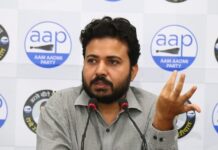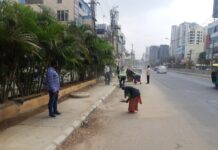
The trumpet of 2019 Lok Sabha elections has already been blown. Bahujan Samaj Party(BSP) in Punjab has taken a leading role in winning the hearts and minds of the voters belonging to all sections of the society particularly the marginalized sections. Local media reports emphasize that there is a great enthusiasm among the SC population in Punjab to see the BSP on the seat of power.
According to 2011 census, Scheduled Castes population in Punjab constitutes 32 percent. No doubt, this rock-solid strength of SC population in Punjab is not enough to get a maximum number of Members of Parliament (MPs) elected provided the local leadership bring SC/OBCs on the same board ‘Ambedkarism’ as the core of its ideology, the party has to propagate the aspects of “Social Transformation and Economic Emancipation” and convince the voters that the BSP is the only political party that has been fighting for their constitutional rights.
Kanshi Ram`s Style of Functioning
Kanshi Ram, the founder of BAMCEF, DS4 and the BSP toured the country by cycle from Kashmir to Kanyakumari to raise awareness among the Dalits about the philosophy of Dr. B. R Ambedkar, the architect of Indian Constitution. He was a leader who believed strongly in building the cadres at the village level. My recent communication with the BSP hardcore followers who worked closely with Kanshi Ram in the state of Punjab assert, “that people used to rush to Kanshi Ram in the public meetings. His style of functioning was to educate the masses and make them aware of their social and economic problems. Further, it is also claimed by the old timer, loyal supporters of the BSP that, “Kanshi Ram was a grassroots level worker who could sit at the cot and sip a tea with the party workers”.
The slogan was given by Kanshi Ram and Mayawati:
Vote Hamara Raj Tumahara, Nahi Chalega Nahi Chalega
(Our Vote your rule, No longer No longer)
has lost sheen over the time among the Dalit masses. The reason being that Mayawati joined hands with the BJP, anti-dalit party and formed a government and become Chief Minister in Uttar Pradesh four times. Anti Mayawati propaganda by the BJP, RSS that she is no more a “Garib Ke Beti” has been corroding the party political base especially in the rural area where the masses are illiterate. It is unfortunate that lies and rumors spread by the opposition parties against the party President Behn Kumari Mayawati tend to confuse the Dalit illiterate masses particularly in the villages of Punjab resulting into splitting of votes.
Contemporary Political Situation of BSP in Punjab
It is a fact that Dalits are known by different nomenclatures in the state as in the country viz: Scheduled Castes, Ravidassis, Neo-Buddhists, Valmikis etc. to name just a few, which are religiously divided. Prof. Ronki Ram, teaching political science at the Punjab University, Chandigarh argues that Despite the common nomenclature—SCs, Dalits are sharply divided into 39 castes. This caste heterogeneity impacts their upward social mobility and political mobilization in multifarious ways(EPW,2017)
The SC leaders belonging to different Ambedkarites/Buddhists/ Ravidassis/Valmiki organizations lack confidence in the present local Punjab leadership since they are neither invited nor welcomed to promote the agenda of the BSP in the state of Punjab. Similarly, OBCs leaders from different religious and social organizations feel alienated from the party. Past studies conducted by sociologists affirm that “the majority of the OBCs leaders are in the grip of Sikh Gurdwaras who are either fed by Akali Dal or Congress party. There is a need to bring different people to a common platform and build a solid front. There is also a need to invite OBCs leaders to garner support for the BSP in the state of Punjab.
Kanshi Ram`s BAMCEF terminology was to create, “ Man, Money and Mind Power”. However, the BAMCEF and the BSP could attract men and monies but Mind Power lacks behind. Mind power means that there should be a core group of intellectual class among the BSP supporters that can study the social and economic problems of the Dalits of Punjab and chart the party programme accordingly and raise the real issues concerning the lives of the Dalits in the state of Punjab.
Real Issues of the Dalits in Punjab
The duty and function of the intellectual class should chart the programmes and guide the party cadre to raise the real issues concerning the welfare of the Dalits. For example, Punjab Scheduled Castes Land Development and Finance Corporation, an undertaking of Punjab Government has no funds to support welfare schemes meant for the Scheduled Castes (Ref Annual Administrative Report 2014-15). The state government, as usual, pass the buck to the central government for not releasing the funds. This blame game between the Centre and the State has economically stopped the Dalits to become entrepreneurs. Doaba Dalits are marginalized as compared to upper caste people because of anti- Dalit policies. Violence against Dalits has escalated dramatically. Reservation is only for the namesake. There is hardly any government job; if at all available that is at the lower level. The current status of the elementary education level of SC students studying in government schools particularly in the villages of Punjab is dismal because of lack of infrastructure and qualified teachers. Media reports state that scholarship meant for the SC students are either usurped by corrupt administrative or reduced to such a low level that does not meet the requirement. A recent case of 210 crore scam of SC students scholarship in Himachal Pradesh is a clear example of plunder of resources meant for the welfare of the Scheduled Castes Students. The Constitution of India is attacked by the Manuwadi forces. The BSP has to fight for the physical and institutional marginalization of the Dalits; non-fulfillment of reservation policies. The land ownership is the lowest in the country by the Dalits. Only 9.23% land is owned by Dalits , according to the NSSO Household Ownership and Operational Holdings in India.
Conclusion
The BSP has to devise new strategies to fight with Brahminical structure. On the other hand, the Dalits need to revisit their tendency of begging for justice. The BSP like other national political parties needs to establish a strong IT cell, media cell to educate the masses about the aims and objects of the party. The local Punjab leadership should emulate the style of functioning of Kanshi Ram to build a grass root network of workers at the village level and establish a communication with them. The party has to raise the social and economic issues of the people of Punjab not only with the state but also the central government and see to it that their demands are met. Today, the Dalits of India knows it very well that it is the only BSP party that can safeguard the constitution of India that guarantees them dignity, justice, and equality. It is true nobody can ignore Behn Kumari Mayawati.









